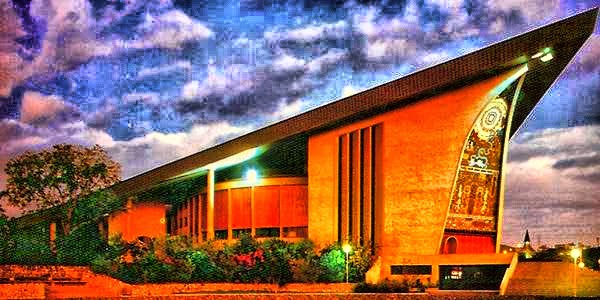PNG SHOULD BRACE FOR A LOOMING FINANCIAL CRISES - MORAUTA
by SIR MEKERE MORAUTA
Papua New Guinea needs to take urgent action to save itself from a looming economic and financial storm, former Prime Minister Sir Mekere Morauta said today.
Sir Mekere, an economist and former head of Treasury, the Bank of Papua New Guinea and other institutions, said the nation cannot continue on its present course.
“The Prime Minister has had plenty of warning from his own expert advisers in Treasury and from eminent foreign institutions and observers,” Sir Mekere said.
“Good senior people in Treasury have been side-lined or sacked, or shipped out if a foreigner. Anyone who raises concerns suffers personal attack from the Prime Minister.
“Or, as with the peaceful protestors who gathered at Unagi Oval on 26 October, being set upon and bashed up by the Police, no doubt on orders from above.
“He has ignored all advice, and now the nation is suffering the consequences.”
The latest warnings come from the international ratings agency Standard & Poor’s (S&P), in its annual review of Bank South Pacific (BSP), and from the World Bank in its annual ranking of countries’ business environment.
BSP’s long-term rating has been downgraded from stable to negative, and Papua New Guinea has fallen four places in the World Bank ranking.
On the BSP downgrade, Sir Mekere said the ratings agency had not said there was anything wrong with the bank itself – it appeared to be in good health and was well managed.
The problem, according to S&P, is the economic and regulatory environment in which BSP operates. “That environment is not created by BSP but like all other businesses, BSP is engulfed by it,” Sir Mekere said.
“In other words, the economic and financial damage has now spread to the private sector – and to the largest financial institution in the country, on which millions of Papua New Guineans and thousands of businesses rely.
“The downgrade means that unless the economic and regulatory environment is not fixed quickly, the cost of borrowing from banks will increase, interest rates on savings and investments will fall, and bank fees and charges will rise. Inflation, prices of goods and services, are also likely to increase as a result.
Sir Mekere said S&P was very clear that the Government’s fiscal policies and practices were the cause of problems and thus the downgrade. It said:
“We believe that Papua New Guinea's financial institutions face increasing risks stemming from increasing credit pressures on both the sovereign and broader operating environment as a result of lower global energy prices.
“We consider it unlikely that BSP would be insulated from increasing credit pressures on both the sovereign and the broader operating environment as falling export revenues increase the risk to the government's financials and the economy's external vulnerabilities.”
Sir Mekere said that neither Papua New Guinea nor the Prime Minister is in a position to influence commodity prices. “All we can do is make urgent downward adjustment to expenditure to accommodate falling revenue,” he said.
“Our problem is that the Government has been on a populist spending spree for the last three years, spending money it did not have, by turning the Central Bank into a money-printing house, and has left the adjustment it needs to make too late.
“As a result, the adjustment will be long and painful, and people and services will suffer.
The downgrading of BSP comes soon after S&P and another leading ratings agency both downgraded the outlook for the country from stable to negative.
On the World Bank ratings, Sir Mekere said the business sector was clearly suffering, and this in turn was worsening living conditions for ordinary Papua New Guineans.
Papua New Guinea fell four places in the World Bank’s Doing Business Survey, from 141 to 145, placing it amongst the worst-managed and most corrupt nations on earth.
Businesses of all sizes – locally owned as well as foreign-owned – are experiencing difficult trading conditions and many are laying off workers.
The Bank of Papua New Guinea recently estimated that employment had fallen by about 3 percent to the middle of the year, with further falls likely.
That means many thousands of Papua New Guineans have lost their jobs this year.
Sir Mekere said the Prime Minister’s insatiable appetite for spending money he does not have coupled with mismanagement of the economy and state finances will cause Papua New Guineans to suffer for a number of years.
“Reckless spending, illegal and wasteful borrowing, the raiding of national institutions like MVIL, Ok Tedi and NPCP to satisfy his spending appetite, and misapplication of billions of kina that should be used for national development have now combined to create a turbulent storm,” he said.
“The value of the kina has almost halved since the Prime Minister came to office. Foreign currency reserves have more than halved in those four years.
“A series of foolish deficit Budgets and mini-Budgets have brought Papua New Guinea to the brink.
“Commercial banks are unable to provide foreign exchange to their customers – apparently there are back-orders for foreign exchange of over K2 billion.
“Importers are suffering, and businesses are unable to meet their payment commitments to overseas suppliers in a normal commercial manner.
“Conditions today are similar in most respects to those caused by the Prime Minister’s PNC predecessor, Bill Skate.
“Only urgent action saved the nation from disaster in 1999, and only a well-structured and disciplined recovery package, implemented consistently over the next four to five years, will create the environment necessary for sustainable economic and social advancement.”







